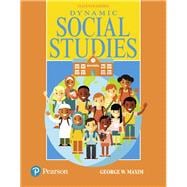About This Book
Dynamic Social Studies, 11th Edition
ISBN: 9780134286716
Dynamic Social Studies, 11th Edition, is a practical guide designed to help elementary social studies teachers create a dynamic learning experience. This book inspires children to understand and participate in social studies, fostering a deeper connection with the subject matter.
Who Uses It?
Primarily, this book is used by elementary social studies teachers and educators who want to engage their students in meaningful and interactive learning experiences. It's also a valuable resource for anyone interested in teaching social studies effectively, including parents and educators looking to enhance their teaching methods.
History and Editions
The 11th edition of Dynamic Social Studies was published in 2017 by Pearson. This edition has been updated to reflect the latest instructional methods and strategies, ensuring that teachers have the most effective tools to reach and teach their students. The book includes sections on social constructivism, cognitive constructivism, and project-based learning, providing a comprehensive approach to teaching social studies.
Author and Other Works
George W. Maxim is the author of Dynamic Social Studies. Maxim brings extensive experience in educational resources and instructional planning to the text, ensuring that it remains current and relevant. While there is limited information available on other books written by Maxim, his expertise in social studies education is evident in this comprehensive guide.
Key Features
- Comprehensive Coverage: The book covers foundational principles of social studies, including effective instructional planning and methods to reach and teach students.
- Interactive Strategies: It includes practical strategies like social constructivism and project-based learning to engage students in meaningful activities.
- Instructional Resources: The book provides resources for teaching social studies, including concrete, representational, informational, and narrative texts.
- Lenses on Learning: It offers a lens on learning through six social sciences—history, geography, civics, economics, sociology, and anthropology—helping students understand various aspects of social studies.
Detailed Information
ISBNs and Formats
- Hardcover: ISBN-13: 9780134286716
- eTextbook: Available with VitalSource (ISBN: 9780134286709)
- Paperback: ISBN-10: 0134286715, ISBN-13: 9780134286716
- Rental Options: Various rental durations available from different retailers
Publication Details
- Publisher: Pearson
- Publication Date: January 18, 2017
- Number of Pages: Not specified
- Language: English
Other Editions and Formats
- 10th Edition: Not available (this edition is the latest)
- eTextbook with VitalSource: ISBN-13: 9780134286709
- Related ISBNs:
- 9780134286709 (eTextbook)
- 9780134286723 (eTextbook rental)
- 9780134286730 (print text)
This detailed information section provides a quick reference for all the available formats and sources for Dynamic Social Studies, 11th Edition, making it easier to find and access the book in the preferred format.











